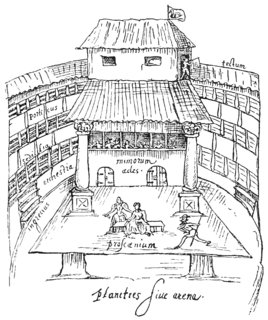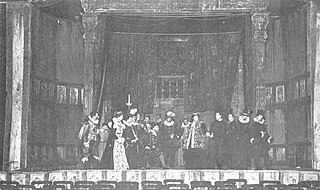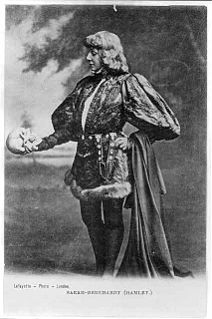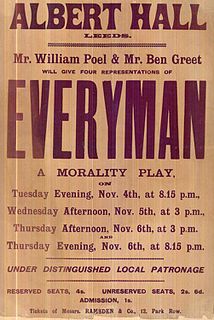Related Research Articles

English Renaissance theatre, also known as Renaissance English theatre and Elizabethan theatre, refers to the theatre of England between 1558 and 1642.

The Somonyng of Everyman, usually referred to simply as Everyman, is a late 15th-century morality play. Like John Bunyan's 1678 Christian novel The Pilgrim's Progress, Everyman uses allegorical characters to examine the question of Christian salvation and what Man must do to attain it.

A theatre director or stage director is a professional in the theatre field who oversees and orchestrates the mounting of a theatre production such as a play, opera, dance, drama, musical theatre performance, etc. by unifying various endeavors and aspects of production. The director's function is to ensure the quality and completeness of theatre production and to lead the members of the creative team into realizing their artistic vision for it. The director thereby collaborates with a team of creative individuals and other staff to coordinate research and work on all the aspects of the production which includes the Technical and the Performance aspects. The technical aspects include: stagecraft, costume design, theatrical properties (props), lighting design, set design, and sound design for the production. The performance aspects include: acting, dance, orchestra, chants, and stage combat.

Stage combat, fight craft or fight choreography is a specialised technique in theatre designed to create the illusion of physical combat without causing harm to the performers. It is employed in live stage plays as well as operatic and ballet productions. With the advent of cinema and television the term has widened to also include the choreography of filmed fighting sequences, as opposed to the earlier live performances on stage. It is closely related to the practice of stunts and is a common field of study for actors. Actors famous for their stage fighting skills frequently have backgrounds in dance, gymnastics or martial arts training.

The Oregon Shakespeare Festival (OSF) is a regional repertory theatre in Ashland, Oregon, United States, founded in 1935 by Angus L. Bowmer. The Festival now offers matinee and evening performances of a wide range of classic and contemporary plays not limited to Shakespeare. During the Festival, between five and eleven plays are offered in daily rotation six days a week in its three theatres. It welcomed its millionth visitor in 1971, its 10-millionth in 2001, and its 20-millionth visitor in 2015. At any given time between five and eleven plays are offered in daily rotation six days a week in its three theatres.
Ben Iden Payne, also known as B. Iden Payne, was an English actor, director and teacher. Active in professional theater for seventy years, he helped the first modern Repertory Theatre in the United Kingdom, was an early and effective advocate for Elizabethan staging of Shakespeare plays, and served as an inspiration for Shakespeare Companies and University theater programs throughout North America and the British Isles. His name lives on as the name of a theater at the University of Texas as well as annual theater awards presented in Austin, Texas.

Theater in the United States is part of the old European theatrical tradition and has been heavily influenced by the British theater. The central hub of the American theater scene is Manhattan, with its divisions of Broadway, Off-Broadway, and Off-Off-Broadway. Many movie and television stars have gotten their big break working in New York productions. Outside New York, many cities have professional regional or resident theater companies that produce their own seasons, with some works being produced regionally with hopes of eventually moving to New York. U.S. theater also has an active community theater culture, which relies mainly on local volunteers who may not be actively pursuing a theatrical career.
Walter Nugent Monck (1878–1958) was an English theatre director and founder of Maddermarket Theatre, Norwich.
William Pole FRS FRSE MICE was an English engineer, astronomer, musician and an authority on Whist.

Shakespeare's plays are a canon of approximately 39 dramatic works written by English poet, playwright, and actor William Shakespeare. The exact number of plays—as well as their classifications as tragedy, history, comedy, or otherwise—is a matter of scholarly debate. Shakespeare's plays are widely regarded as being among the greatest in the English language and are continually performed around the world. The plays have been translated into every major living language.

William Poel (1852-1934) was an English actor, theatrical manager and dramatist best known for his presentations of Shakespeare.

Medieval theatre encompasses theatrical performance in the period between the fall of the Western Roman Empire in the 5th century and the beginning of the Renaissance in approximately the 15th century. The category of "medieval theatre" is vast, covering dramatic performance in Europe over a thousand-year period. A broad spectrum of genres needs to be considered, including mystery plays, morality plays, farces and masques. The themes were almost always religious. The most famous examples are the English cycle dramas, the York Mystery Plays, the Chester Mystery Plays, the Wakefield Mystery Plays, and the N-Town Plays, as well as the morality play known as Everyman. One of the first surviving secular plays in English is The Interlude of the Student and the Girl.

William Bridges-Adams was an English theatre director and designer, associated closely with the Shakespeare Memorial Theatre, Stratford-upon-Avon, from 1919 until 1934.

The Maddermarket Theatre is a British theatre located in St. John's Alley in Norwich, Norfolk, England. It was founded in 1921 by Nugent Monck.

Thousands of performances of William Shakespeare's plays have been staged since the end of the 16th century. While Shakespeare was alive, many of his greatest plays were performed by the Lord Chamberlain's Men and King's Men acting companies at the Globe and Blackfriars Theatres. Among the actors of these original performances were Richard Burbage, Richard Cowley, and William Kempe.

Hamlet by William Shakespeare has been performed many times since the beginning of the 17th century.

Richard L. Hay is the Principal Theatre and Scenic Director at the Oregon Shakespeare Festival.
Richard Southern was a British theatre designer and lecturer, best known for his extensive pictorial documentation of historical theatre construction, the Richard Southern Print Collection, comprising some 22,500 visual images. A prolific stage designer and theatre restorer, Southern devoted decades to researching and documenting theatre construction.

Everyman is a modern play produced by Charles Frohman and directed by Ben Greet that is based on the medieval morality play of the same name. The modern play was first performed in 1901 in Britain, and opened in the United States in 1902 on the Broadway stage. The play had a Broadway run of 75 performances, with tours over the next several years that included four Broadway revivals.

Frederick Rogers was an English bookbinder, trades unionist, writer and journalist. He is notable as first chairman of the Labour Representation Committee, the organisation to which the Labour Party traces its origins, as well as for a lifetime of work dedicated to educational improvement for the working class, and to the introduction of a general tax-funded system of old-age pensions.
References
- ↑ Rogers, Frederick (1913). Labour, Life and Literature. London: Smith, Elder & Co. pp. 168–169.